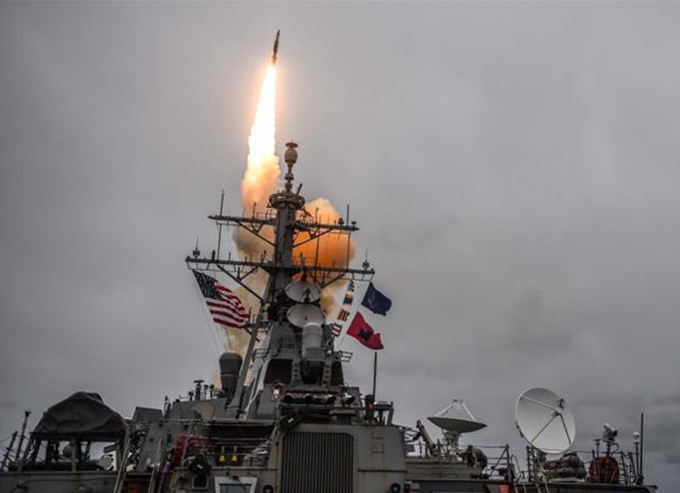
OPINION: By Professor Kevin P Clements in Dunedin
Donald J Trump poses major problems to world order. His administration is unraveling, he has no coherent foreign or domestic policy strategy and the Mueller inquiry is beginning to expose serious criminal activity on the part of the President and his close associates.
As a consequence, Trump, is showing signs of personal as well as political unraveling. He is exhibiting classic symptoms of too many stress hormones in his body which is having a major impact on his hipppocampal and frontal lobe functioning.
As a result, Trump is experiencing confusion, has difficulty concentrating, trouble learning new information, and is experiencing major problems with his decision-making.
This was noted first in Michael Wolff’s book Fire and Fury and most recently in James Comey’s new book A Higher Loyalty: Truth, Lies, and Leadership.
Trump’s decision to launch a missile strike against chemical weapons facilities in Syria owes more to personal and cognitive stress than political or military calculation. It is a classic diversionary tactic aimed more at boosting popularity and deflecting attention from Trump’s domestic political woes rather than addressing ways of bringing the Syrian Civil War to a conclusion.
It was an impulsive high risk strategy and the fig leaf of approval from Theresa May and Emmanuel Macron does little to give it either Alliance or United Nations legitimacy.
Without peace in Syria the prospect of dealing with Assad’s chemical weapons or his gross violations of human rights are very slim indeed. The US, UK and French interventions will impede a negotiated solution to the Syrian Civil War and they do little or nothing to deal with Bashar Assad’s gross violations of human rights and other mass atrocities which continue to this day.
Hollow justification
The message from yesterday’s strike against the chemical weapons plants is that Assad is free to keep killing his people by any non-chemical means.
President Trump and his Secretary of Defence have said that the strike was to enforce international laws and norms regarding the use of chemical weapons. This justification seems hollow when no Trump administration officials have articulated how these strikes fit into a larger Syrian diplomatic and military strategy.
The risks of this military intervention remain high. The Russians, Syrians and the Iranians are now all united against the United States and its allies; we are witnessing the beginning of a new cold war and the prospects for negotiated solutions to the Civil War in Syria and peace in the Middle East seem even more remote now than before the strikes began.
This is a big challenge to the whole world. We are all affected by the behaviour of a man who has demonstrated his singular unsuitability for any political office and whose actions have implications for global peace and stability.
How do those of us who are not American citizens, deal with psychopathology at the heart of the US government? In the first place we must work with American individuals and organisations who are as worried about this action as we are.
There are some hopeful signs. Democratic Senator Tim Kaine, for example, called Trump’s decision “reckless” and “illegal”, and expressed concern that the action might embolden Trump to bomb Iran or North Korea.
Senators Chris Murphy and Bernie Sanders and Representatives Ro Khanna, Barbara Lee and Jerry Nadler, have called the attack unconstitutional, illegal and destructive and demanded congressional authority for any war making, and an investment in diplomacy instead of missile strikes.
Republican disquiet
There was disquiet in the president’s own party, also, as Republican Congressman Thomas Massie called it “unconstitutional.”
Second , we need to focus on real solutions to alleviate the terrible suffering of the Syrian people. There are 3.2 million people within Syria in need of direct humanitarian assistance. There are millions more who remain as refugees in Turkey and other parts of Europe.
Most importantly, we need to take the issues of chemical weapons and a negotiated peace in Syria back to the United Nations where it belongs.
Third, Americans and the rest of the world have to work out ways in which we can both monitor and resist the hawkish policies of Mike Pompeo (about to be confirmed as the new Secretary of State) and John Bolton the new National Security Advisor.
They will encourage Trump’s impulsiveness and desire to distract attention from domestic and personal issues with reckless foreign policy adventures that will do nothing to maintain American security or build global peace.
I hope that the American people mobilise to ensure that this illegal and unilateral decision to attack chemical weapons facilities is challenged and contained. But more importantly, I hope that more attention will be given in the US and the rest of the world to the development of rational Middle East and global foreign policy positions so that the unilateral use of force and coercive diplomacy is resisted .
I also hope that there are some wise heads in or near the White House who might suggest that the President take some time off to seek professional help for his serious personal pathology which, if left unchecked, will have negative consequences not only for his administration and the well being of America, but the peace of the whole world.
Professor Kevin P Clements is director of the National Centre for Peace and Conflict Studies,
University of Otago.











































